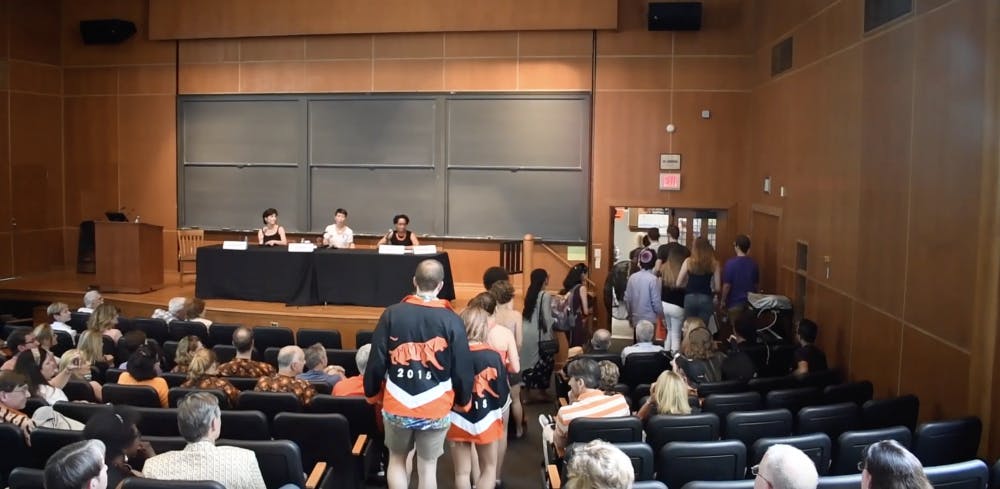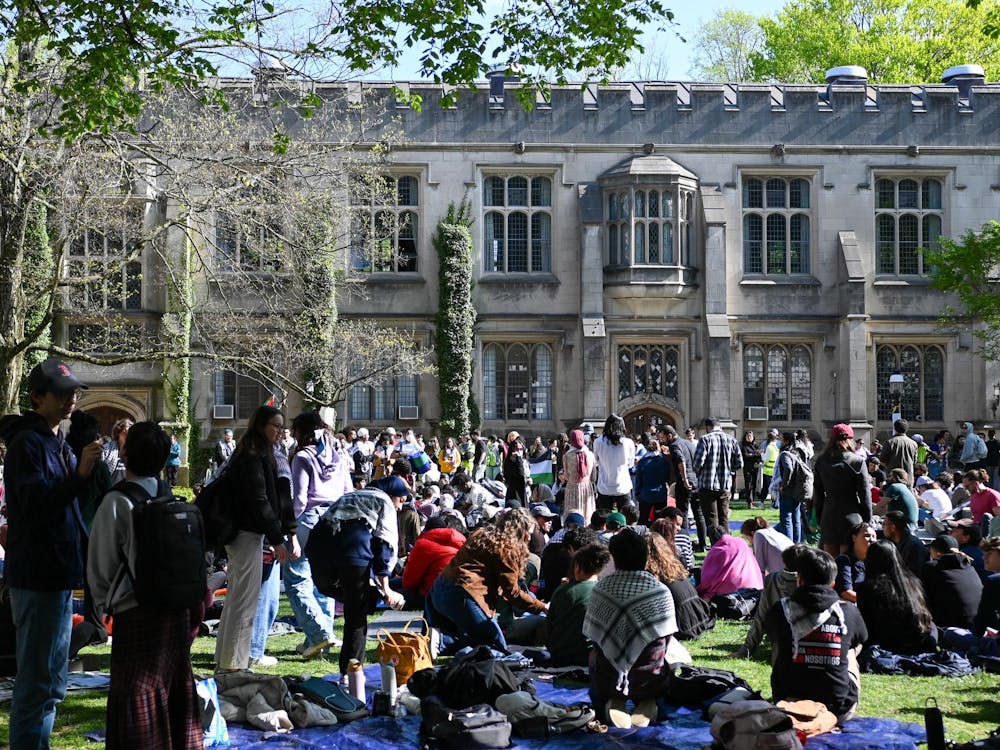The weekend of Reunions witnessed renewed activism from students affiliated with Princeton IX Now, which has protested against the University’s enforcement of Title IX since last month.
On June 1, a group of students seeking to reform policies relating to the Title IX office at the University staged a walk-out of a #MeToo panel and held signs and donned purple in lieu of orange and black at the P-Rade.
At the #MeToo Alumni-Faculty Forum, students protested against the inclusion of Beth A. Wilkinson ’84, a founding partner at Wilkinson Walsh Eskovitz LLP, which has defended Supreme Court Justice Brett Kavanaugh and Virginia Lieutenant Governor Justin Fairfax against sexual assault allegations.
Also featured on the #MeToo panel were Rachael Wong ’94, founder of One Shared Future and former leader of the State of Hawaii Department of Human Services, where, during her tenure, she filed a sexual harassment complaint against the Speaker of the House, and Kellen Heniford '14, Ph.D. candidate and a Richard Hofstadter Fellow in the Department of History at Columbia University.
Department of Anthropology chair Carolyn Rouse introduced the speakers and alluded to the prospect of students walking out, and Wilkinson opened by discussing the importance of a fair process in sexual assault cases.
Heniford began by explaining how she was excited to be a part of a positive conversation about the “mass awakening our society seems to be undergoing with respect to the pervasiveness of sexual assault.”
She added that she was disappointed to find out that Wilkinson, who defended Kavanaugh, was also invited, reminding the audience that Wilkinson's firm also defended Fairfax after he was accused of sexual assault by Vanessa C. Tyson ’98, who attended Reunions and previously participated a panel.
“I am not interested in discussing before this audience why Dr. Christine Blasey Ford’s testimony was so difficult for survivors to witness, and why Kavanaugh’s white hot fury at his own hearing was a terrifying reminder of the abuse many of us have suffered,” she said. “I did not anticipate that the Alumni Affairs Office’s version of ‘both sides’ on the MeToo issue would look like this—survivors and their defenders somehow pitted against a prominent defender of a prominent man accused of abuse."
“These are not intellectual exercises or abstract debates,” Heniford added. She proceeded to invite the audience to walk out on the panel, stand up along with around 30 others, and exit the auditorium.
Heniford had contacted Princeton IX Now after finding out that Wilkinson would sit on the panel with her, and together, they planned the walkout, explained K Stiefel ’20, one of the protest’s organizers.
“A productive dialogue wouldn’t have been possible,” Stiefel explained, adding that Wilkinson’s inclusion precluded a discussion of sexual misconduct that incorporated survivors.
The majority of the audience remained in place for the rest of the panel, and Rouse addressed the audience and said she supported Heniford’s decision to walk out.

The panel continued, with Wilkinson and Wong fielding questions from the audience.
Wong discussed the importance of putting women in positions of power.
When Wilkinson was pressed on her decision to defend Kavanaugh, she explained, “once you take him as a client, you have to defend him,” adding that lawyers typically take on jobs without learning all the facts until later.
One alumnus asked about the threat of false accusations, a question which drew criticism from other audience members, who called it male-centered.
Outside the lecture hall, Heniford told the ‘Prince’ she had no personal animus for Wilkinson but felt that the decision to include her on the panel was “callous.”
Attendees told the ‘Prince’ that they appreciated hearing both sides of the discussion and wished Heniford had stayed on the panel and responded to the questions.
The University stood by its decision to host the forum.
“The University takes seriously its mission to support the free expression of all views,” wrote Michael Hotchkiss, Deputy University Spokesperson, in an email. “In this specific case, that includes the views of all the panelists as well as those who chose to leave the room. Those who excused themselves from the forum missed out on a robust and informative conversation on an important topic.”
The forum, hosted by the Office of Alumni Affairs, took place at 8:45 a.m. in McCosh 10 on June 1.
Hours later, students affiliated with Princeton IX Now held posters and chanted as alumni marched along the route of the P-Rade. In particular, students criticized how the University currently handles Title IX cases.
According to Stiefel, one alum donated 3,000 buttons that read “Listen and Act,” all of which were distributed. Another alum donated purple fabric, which Princeton IX Now members cut up and gave out to be worn. Among others, members of the marching band donned the fabric
Purple is associated with interpersonal violence prevention.
“We wanted to celebrate the history of activism and celebrate and support alums who were survivors of sexual assault and harassment on this campus because it is so blatantly ignored by this administration,” Stiefel said.
Princeton IX Now sought to display a history at odds with the narrative typically presented at the P-Rade, during which alumni often sport signs detailing historic events that occurred during their time as undergraduates. Princeton IX Now signs celebrated student activism in past decades, including student protests against the Vietnam War, the 2015 Black Justice League (BJL) sit-in, and the Take Back the Night walk.
One student held a sign that read, “2014: Princeton found in violation of Title IX by U.S. ED Office of Civil Rights,” referring to the violation that led the University to revise its policies in order to comply with the Office of Civil Rights (OCR).
Stiefel explained that the protest allowed alumni to enjoy the P-rade while also bringing attention to issues of sexual misconduct.
Many alumni joined students by wearing pins and purple.
“Alums are concerned, too,” explained Stiefel. “It speaks to the fact that the issue that we are trying to get the university to address are longstanding issues that have affected generations of Princetonians.”
Stiefel argued the P-Rade revealed that both current and former students were dissatified with the University’s handling of cases of sexual misconduct.
“This campus has not been the best place for all of its students through the years,” they added.









